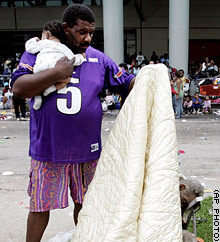I’ve written before about the sociological dimension of disasters — the fact that natural disasters are never wholly natural, because some kinds of people will be more likely to suffer and die than others, depending on how life is organized when the disaster hits. As everyone knows, social order is under severe pressure in New Orleans at the moment, and the media coverage is slowly coming around to analyzing the differential impact of the disaster. The fact that those who have been left behind, or turned into refugees, are disproportionately Africian-American, poor, or elderly is simply impossible to ignore from the media coverage. Seeing pundits and commentators react to these facts is, in a way, a barometer of their sociological imagination — their ability to see the systematic relationship between social structure and individual experience. For example, on the conservative side of the fence, the contrast between David Brooks and Jonah Goldberg (also here) is striking. Brooks is one of nature’s optimists, and his vice is a tendency towards complaceny. But he has a sociological eye, and immediately grasps the social dimensions of the disaster:
Floods wash away the surface of society, the settled way things have been done. They expose the underlying power structures, the injustices, the patterns of corruption and the unacknowledged inequalities. … We’d like to think that the stories of hurricanes and floods are always stories of people rallying together to give aid and comfort. … Amid all the stories that recur with every disaster – tales of sudden death and miraculous survival, the displacement and the disease – there is also the testing. … Civic arrangements work or they fail. Leaders are found worthy or wanting. What’s happening in New Orleans and Mississippi today is a human tragedy. But take a close look at the people you see wandering, devastated, around New Orleans: they are predominantly black and poor. The political disturbances are still to come.
Brooks’ instinct to look at how the disaster exposes power relations and tests the social order is right on target. Contrast this with Goldberg. All _his_ instincts are that talk of class and poverty and refugees are merely rhetorical cards in a never-ending political slanging match, and his goal is to make sure they don’t get played. His immediate concern is to deny that there are any systematic differences in the experience of disaster, and to pretend it’s all just a question of partisan labeling:
bq. Whatever happened to the idea that unity in the face of a calamity is an important value? We’re all in it together, I guess, except for the poor who are extra-special.
And again:
bq. My guess is that it will simply be a really unpleasent time for [Superdome refugees for] the remainder of the day, but hardly so unpleasent as to sanctify them with refugee or some other victim status.
Burkean conservatives may be too sanguine about the virtues of inherited ways of doing things, but, if they have Brooks’ cast of mind they at least understand that there _is_ a social order, and that disasters like Katrina expose its structure and weaknesses. Meanwhile Goldberg — whom I’m sure has never gone a day without a hot meal in his life — is merely vicious.
